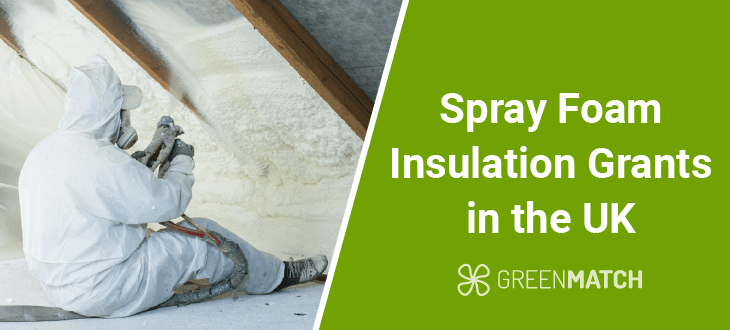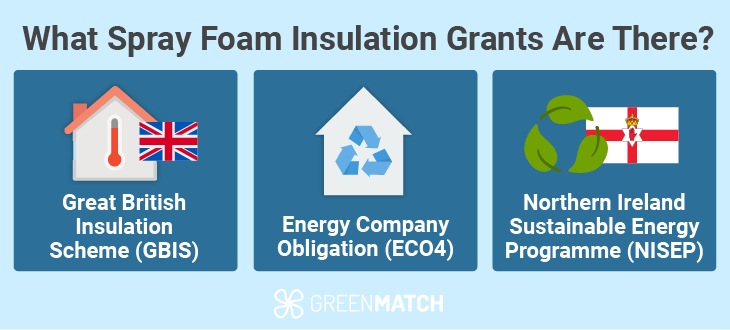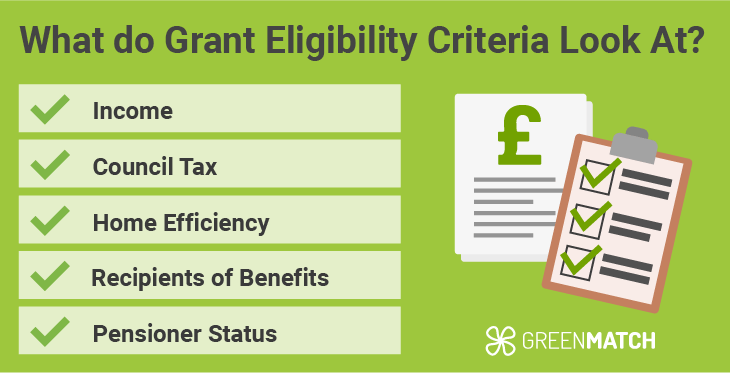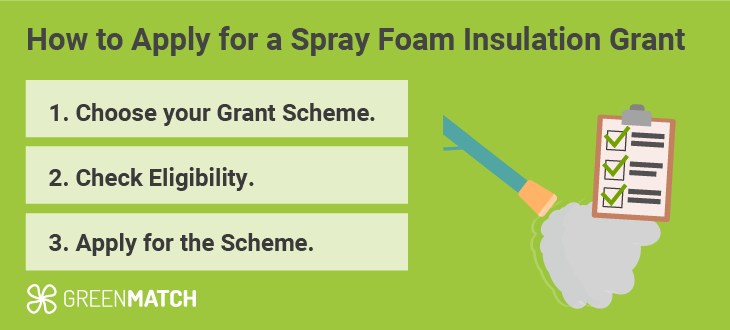Answer these simple questions and we will find you the BEST prices
Which type of solar quotes do you need?
It only takes 30 seconds
100% free with no obligation

Get Free quotes from insulation specialists near you

Save money by comparing quotes and choosing the most competitive offer

The service is 100% free and with no obligation
- GreenMatch
- Insulation
- Insulation Grants
- Spray Foam Insulation Grants
Spray Foam Insulation Grants: A UK Guide


- Polyurethane spray foam costs around £21.5 per m2 excluding installation costs.
- Spray foam is commonly used for cavity walls, underfloor, loft and roof insulation.
- Two key grant schemes in the UK provide full and partial coverage for spray foam insulation, the Great British Insulation Scheme (GBIS) and the Energy Company Obligation (ECO4).
Spray foam insulation exhibits some of the most impressive thermal insulation properties of all insulation materials on the market.
Commonly used for cavity walls, underfloors and lofts, this expanding foam normally made from polyurethane can create an air barrier that can drastically improve a home's energy efficiency, leading to massive annual savings, a comfortable home environment, and a higher Energy Performance Certificate (EPC) rating for your home.
Unfortunately, spray foam insulation is also one of the most expensive insulation materials on the market, making it harder to afford. Luckily, the UK government has rolled out two key insulation grant schemes to help low-income, fuel-poor, and energy-inefficient households with free insulation upgrades or partial cost coverages.
This ultimate GreenMatch UK guide will give you all you need to know about spray foam insulation grants, qualifying factors, and how to apply.
Ready to insulate your home? Let GreenMatch UK handle the pesky research and vetting for you. Fill out our 30-second form and receive up to 3 free home-tailored quotes from our trusted network of pre-vetted installers. No charges or obligations. Click the button below to begin!
- Describe your needs
- Get free quotes
- Choose the best offer
It only takes 30 seconds



Spray foam insulation government grants

In the UK, two main government grant schemes deliver free and reduced spray foam insulation for qualifying households and applicants. These are the Great British Insulation Scheme (GBIS) and the Energy Company Obligation (ECO4).
While similar, both schemes have slight differences in their qualifying criteria, application process, and provisions that are worth considering.
Great British Insulation Scheme
The Great British Insulation Scheme (GBIS) is a UK government initiative aimed at improving the thermal insulation of the UK housing stock. It does so by assisting low-income, fuel-poor, and energy-inefficient households with insulation upgrades.
The GBIS administers a single measure per household, decided by a home assessment to determine the best course of action to improve thermal efficiency. This helps the scheme maximise its reach across the UK.
ECO4 scheme
The Energy Company Obligation (ECO4) slightly differs, in that it is an obligation placed on energy companies themselves to assist with efficiency upgrades to qualifying households. The ECO4 provides more than just home insulation, but also energy system repairs, replacements, and even smart control installations.
The ECO4 scheme takes a more whole-house approach to domestic improvement, administering up to 5 different energy-saving measures to qualifying households such as insulation for walls, boiler upgrades, and window glazing.
NISEP scheme (Northern Ireland)
For residents of Northern Ireland outside the coverage of the GBIS and ECO4, there is an alternative scheme called the Northern Ireland Sustainable Energy Programme (NISEP). This is an umbrella scheme that functions similarly to the Energy Company Obligation (ECO4).
The NISEP is a collective fund consisting of contributions from electricity customers via a public service obligation (PSO). This fund of around £8 million is then distributed to low-income and fuel-poor homes for efficiency upgrades, such as spray foam insulation.
Eligibility criteria for spray foam insulation grants

To get spray foam insulation grants from either the Great British Insulation Scheme (GBIS) or the Energy Company Obligation (ECO4), there are a series of qualification criteria you need to meet in order to benefit.
These criteria mainly gauge your status as a low-income earner, your home’s energy efficiency, and the amount of council tax you pay. Here’s the full breakdown:
Income criteria
Both the GBIS and the ECO4 generally focus on meeting the needs of the low-income group, followed by the general group. Low-income households are understood to have an annual gross income below £31,000.
Here’s a more detailed breakdown of what is generally expected for each financial group:
Low-income group:
- An annual gross income below £31,000.
- Homeowners & private renters with an EPC rating of E and below (renter) or D and below (homeowner).
- Recipients of a means-tested benefit (e.g. Pension Credit Savings or Pension Credit Guarantee).
General group:
- Homeowners who live in council tax band A - D in England, or A - E in Scotland and Wales, AND have an EPC rating of D or below.
Households with at least one member receiving a means-tested government benefit are often eligible. Here’s a full list of benefits that are recognised to qualify for grant schemes:
- Income-based Job Seekers Allowance
- Income-related Employment and Support Allowance (ESA)
- Income Support
- Pension Credit
- Guarantee Credit
- Working Tax Credit
- Child Tax Credit
- Universal Credit
- Housing Benefit
Qualifications for the NISEP scheme for Northern Ireland residents are quite basic:
- You must be a homeowner in Northern Ireland.
- Have an annual household income of less than £28,000.
- Have a total annual household income of less than £40,000.
Council tax criteria
The low-income status of a home can also be reflected in the amount of council tax you have to pay. Council tax bands are ranges used to determine your property value, as well as how much council tax you pay based on this value.
Homes that fall into the council tax bands A to D in England, and A to E in Scotland and Wales can qualify for grants from either scheme.
Energy efficiency criteria
An Energy Performance Certificate (EPC) rating tells you how efficient your home is. It helps you understand how much energy your household is consuming, and its following impact on the environment. EPC ratings are ranked from A (most efficient) to G (least efficient).
For the Great British Insulation Scheme, the EPC rating qualification range differs if you own or rent your home:
- Private home renters: EPC rating of D or E.
- Homeowners: EPC rating of D to G.
Every home should - in theory - have an EPC rating. If you don’t know yours, arrange an inspection with a housing assessor via the official UK website. Most insulation installers are also able to conduct an EPC assessment of your property.
Pensioners criteria
Pensioners and individuals above the age of 70 can still get spray foam insulation grants, but age alone isn’t a qualifying factor. Pensioners can receive a grant if they meet the criteria for the low-income or general group.
Particularly for the ECO4, pensioners may get for free or reduced cost spray foam insulation via the ECO4 Flex, a local authority-based household referral program to make cases for homes that do not meet eligibility, but are considered vulnerable.
- Households that are considered low-income.
- Households with a resident that has a medically diagnosed health condition exasperated by the cold.
- Households with a resident child under the age of 5 or a resident over the age of 65.
Applying for spray foam insulation grants

Applying for a spray foam insulation grant is a relatively straightforward process regardless of the grant scheme you opt for. Here are the steps you can expect to take:
- Choose your grant scheme: Based on the provisions of each grant scheme, choose the option that best suits your needs. For example, if it's just insulation you seek, the GBIS scheme may be sufficient, but if there are other home upgrades you may want assistance with, the ECO4 scheme may be more fitting.
- Check eligibility: Before applying, make sure to check that you meet most if not all of the qualification criteria for your chosen scheme. This will help you save time and effort in the long run.
- Apply: For the GBIS scheme, visit the official UK government website and fill out the online application form. You can also contact the scheme representatives via email or phone. For the ECO4, contact your energy provider to kickstart the application process.
- Find the right installer: Once you have been granted eligibility for your chosen scheme, it’s important to work with a PAS 2030-2035 accredited installer who can ensure your insulation job is done with high-quality workmanship.
It’s very important to work with a professionally accredited spray foam insulation installer to avoid a shabby job that can lead to mounting repair costs and home damage.
Understandably, finding the right installer at the right prices can feel overwhelming, and not everyone has endless hours to spend on research, vetting and getting multiple quote prices, but that's where GreenMatch UK can help.
By just spending 30 seconds of your time on our online form, you can receive up to 3 free home-tailored quotes from our nationwide network of professional installers. The best part? Our services are completely free and without obligation. Click the button below to begin!
- Describe your needs
- Get free quotes
- Choose the best offer
It only takes 30 seconds



FAQ
You can get a government grant for spray foam insulation in the UK through the Great British Insulation Scheme (GBIS) or the Energy Company Obligation (ECO4) if you meet the qualifying criteria. For residents of Northern Ireland, a spray foam insulation grant can be acquired via the Northern Ireland Sustainable Energy Programme (NISEP).
Generally, households that are considered low-income or fuel-poor are prioritised. Indicators like your gross annual income, home EPC rating, council tax bands, and whether you are a recipient of government benefits are the main criteria that are gauged.

Akif is a copywriter at GreenMatch since 2023. With a keen interest in community sustainability, green solutions and the role of digital media in identifying climate trends, he aims to hone in on his background in International Studies and Digital Media to provide a multidisciplinary approach to written content rooted in credible research and accuracy.
We strive to connect our customers with the right product and supplier. Would you like to be part of GreenMatch?

